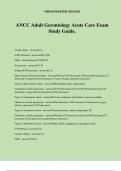©BRAINBARTER 2024/2025
ANCC Adult Gerontology Acute Care Exam
Study Guide.
Cardiac Index - answer✔2-4
SVR/Afterload - answer✔800-1200
MAP - answer✔mean CVx80/CO
PA pressure - answer✔15-30
Wedge PCWP pressure - answer✔6-12
Hypovolemic Shock Parameters - answer✔Preload CVP decreased, SVR afterload increased, CI
decreased, Oxygen delivery Decreased, Venous Oxygen saturation increased
Types of hypovolemic shock - answer✔Hemorrhage, burns, pancreatitis
Cardiogenic shock parameters - answer✔CVP preload increased, SVR afterload increased, CI
decreased, oxygen delivery decreased, SV02 decreased
Types of cardiogenic shock - answer✔Post mi, malignant dysrhythmia, acute myocarditis
Obstructive shock parameters - answer✔Preload either, SVR increased, CI decreased, oxygen
delivery decreased, SV02 decreased
Types of obstructive shock - answer✔Tension pneumo, cardiac tamponade, PE
Distributive shock parameters - answer✔Preload CVP decreased, afterload SVR decreased, CI
increased, SV02 decreased, oxygen delivery increased
Types of distributive shock - answer✔Septic shock, anaphylaxis, neurogenic shock
CVP Preload - answer✔2-8
Cardiac Output - answer✔4-8
MAP - answer✔70-90
, ©BRAINBARTER 2024/2025
Fractional Excretion of NA <1% - answer✔Prerenal state of kidney dysfunction (i.e.
dehydration)
Fractional Excretion of NA >2% - answer✔ATN (acute tubular necrosis)
CPP equation - answer✔MAP-ICP
SIADH Hyposmolar hyponatremia "inappropriate water retention" - answer✔serum sodium low,
serum osmo low <280, urine osmo high >100, no dehydration, tx restrict fluids
if neuro symptoms give 3%NS
DI Hyperosmolar hypernatremia dry - answer✔Serum sodium high, serum osmo high >290,
urine osmo low <100, urine spec grave 1.005 (urine is like water), urine sodium >20,
dehydration, if serum Na >150 give D5W to replace ½ volume deficit in 12-24 hours, avoid
rapid lowering of Na, DDAVP for acute situations
Serum Osmo - answer✔280
Urine Osmo - answer✔300-800
Sodium - answer✔~140
Total cholesterol - answer✔<200
Triglycerides - answer✔<150
HDL - answer✔>40
LDL - answer✔<100
Management of pulm edema - answer✔02, sitting up, morphine 2-4mg, Lasix 40, another Lasix
40 if needed
Left heart failure - answer✔LUNGS, dyspnea at rest, rales, wheezing, generally healthy except
acute event, S3, murmur of mitral regurg
Right heart failure - answer✔JVD, hepatomegaly, peripheral edema
MR ASS - answer✔Mitral regurg, aortic stenosis, systolic murmurs
MS ARD - answer✔Mitral Stenosis, aortic regurg, diastolic
Mitral murmur locations - answer✔5th ICS, apex
Aortic murmur locations - answer✔2nd or 3rd ICS, base
S1 - answer✔AV valves closed, SL open
, ©BRAINBARTER 2024/2025
S2 - answer✔SL closed, AV open
Cardiac blood flow - answer✔SVC,RA, tricuspid, RV, pulmonic valve, pulmonary artery, lungs,
pulmonary veins, LA, mitral, LV, Aortic valve, aorta, body
Cushing's - answer✔Moon face, buffalo hump, hypertension, HYPERglycemia,
HYPERnatremia, HYPOkalemia, tx depends on cause (stop meds, tumor)
Addison's ADRENOcorticoid deficiency - answer✔Remember: SEX, SALT, and SUGAR
Deficient cortisol, androgens, and aldosterone, hyperpigmentation in buccal mucosa, tanning,
HYPOtension, scant hair, HYPOglycemia, HYPOnatremia, HYPERkalemia, cosyntropin is the
rule out for addison's, manage: referral, glucorticoid, hydrocortisone, fludrocortisone inpatient:
hydrocortisone and fluids
HYPERthyroidism/Grave's - answer✔TSH LOW, T3 High, Grave's Disease, bulgy eyes, weight
loss, fine thin hair, smooth skin, a fib
Specialist referral, propranolol, methimazole, PTU, lugol's
Thyroid crisis - answer✔PTU or Methimazole with adjunct within 1 hour Lugol's propranolol,
hydrocortisone
No ASA
Hypothyroidism - answer✔(TSH assay most sensitive test) TSH ELEVATED, T4 LOW
hasimototo's most common, LOW AND SLOW, cold intolerance, weight fain, brittle nails,
brady, hypoactive BS, Levothyroxine 50-100mcg
Myxedema Coma - answer✔AIRWAY, fluid replacement PRN, levothyroxine 400mcgIVx1
Subacute thyroiditis - answer✔Treated symptomatically with propanonlol
Pheocromocytoma - answer✔Labile hypertension, TSH normal, postural hypotension, plama-
free metanephrines to rule out, CT to confirm, surgical removal, postop: hypotension, adrenal
insufficiency, hemorrhage
urine catecholamines, alpha blockers phentolamine
DKA - answer✔-intracellular dehydration, kussmaul, hyperglycemia >250, ketonemia,
hyperkalemia
Management: 1L first hour>500ml/hr, 0.1/kg/hr, glucose <250 change to D51/2




